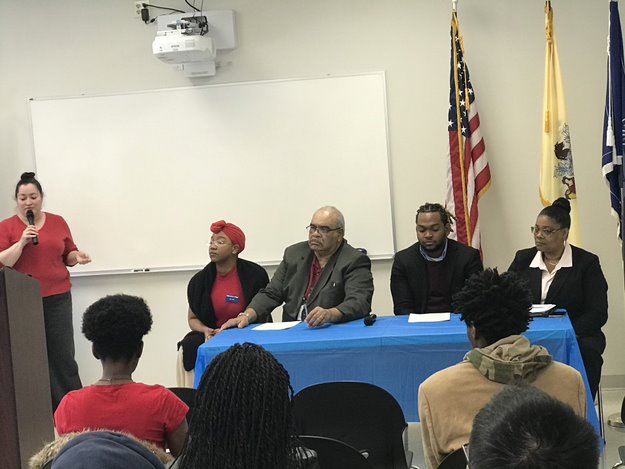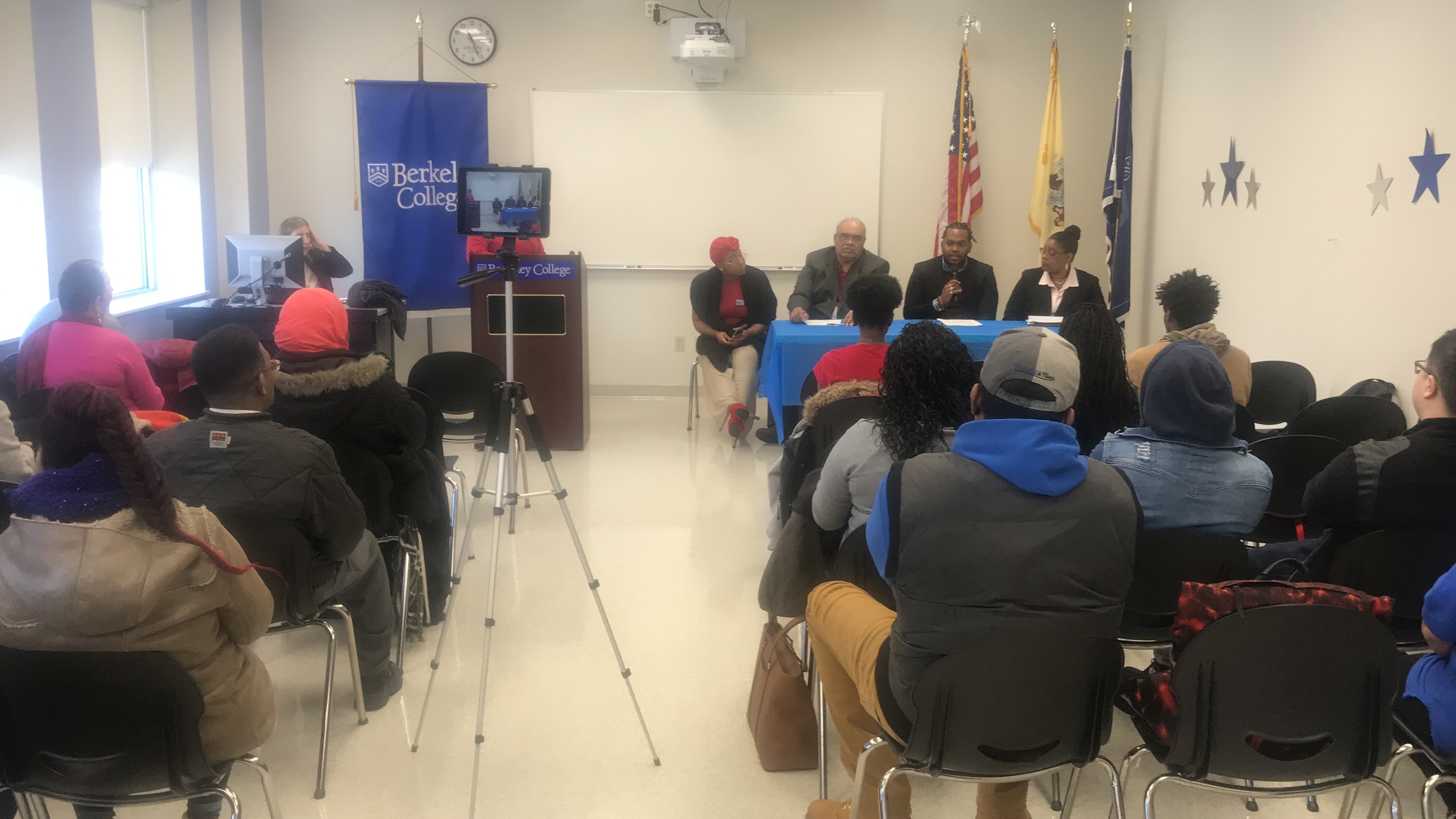Berkeley College Hip-Hop Symposium Brings Social Issues Front and Center during Black History Month
 |
|
| FOR IMMEDIATE RELEASE WEDNESDAY, FEBRUARY 27, 2019 |
Contact: Ilene Greenfield Director of Media Relations 973-278-5400, Ext. 1-5122 IGL@BerkeleyCollege.edu |
|
BERKELEY COLLEGE HIP-HOP SYMPOSIUM BRINGS SOCIAL ISSUES FRONT AND CENTER DURING BLACK HISTORY MONTH |
|
See caption below.
Share the News: @BerkeleyCollege #BlackHistoryMonth
The Hip-Hop Symposium at Berkeley College provided the opportunity for students and faculty to address important social issues, especially called forth in today’s field of hip-hop entertainment. Prior to the Symposium, students, faculty and staff had the opportunity to view the 2006 documentary “Hip-Hop: Beyond Beats and Rhymes.” The film provides an examination of masculinity, violence, homophobia and sexism in hip-hop music and culture, through interviews with artists, academics and fans. It includes interviews with many hip-hop artists such as Busta Rhymes, Chuck D, Clipse, Doug E. Fresh, Fat Joe, Jadakiss, M-1, Tim’m West, Mos Def, and Talib Kweli. More than 100 students participated in the Symposium, which accelerated dialogue on difficult topics about how rap music may be shaping our culture, reinforcing racist stereotypes of black men, and promoting harmful ideas about gender and sexuality. This was one of numerous Berkeley College activities held in celebration of Black History Month.
One of the first questions asked of the panel during the Hip-Hop Symposium at Berkeley College in Newark on February 14, 2019, was whether the film addressed racism more than sexism. Panelists and audience participants seemed in agreement.
“We have to make a change, but we have to make a change in the right direction,” said Professor Clark Hill, Justice Studies – Criminal Justice, Berkeley College School of Professional Studies, one of the panelists. He explained that while the country faced lot of issues in the 20th century through activism, such as the civil rights movement, the structure of society has not changed. He acknowledged that everyone has bias to some degree and he asked students to think about ways to break new ground in addressing racism and gender issues.
“Look at all of the organizations that have been established like the NAACP or Black Lives Matter,” said Romel Roachford, Director, Berkeley College Center for Academic Success, another panelist. “Some people are more sensitive to certain issues. Hollywood is starting to realize that. There are some who own production companies where women are getting paid the same amount as men.”
Berkeley College student Khali Raymond of Newark, NJ, said we should bring awareness to the issues through conversations. Another Berkeley College student, Surayya Butler of East Orange, NJ, commented, “I believe we are going about bringing awareness to these issues in the wrong way. To be accountable as an individual would mean more. Individuals have more control. It is your choice to bring what you see in the media to your mind and your actions."
Professor Gloria M. Davy, PhD, Social Sciences, Berkeley College School of Liberal Arts, said, “In order to bring about change, it should be addressed from the individual, family, community and societal perspectives.”
Views about What Masculinity Means Vary
The topic of what masculinity means brought out several perspectives.
“There is no concrete definition of masculinity,” Mr. Roachford said. “You do not have to be aggressive or violent as today’s world suggests.”
Berkeley College student and panelist Sheelia Brascomb of Newark suggested that some men cannot come to terms with the possibility that women can be better in certain ways. “That does not mean you are less of a man or less of a person,” she said.
“What is your responsibility as a man, a parent, and most importantly, yourself?” asked Professor Clark. When he was young, his father told him, “I can’t give you anything. I gave you a name; don’t destroy it.”
“It’s not about a name,” Professor Clark said. “It’s about yourself.”
What about Individual Social Responsibility?
In addressing the topic of hip-hop in relation to mental health and society, Professor Davy suggested viewing masculinity from three perspectives – sociological, biological and psychological. “Culture plays a major role,” she said.
With regard to the question of whether artists should publish socially responsible work, viewpoints varied. Mr. Roachford suggested that the artist should provide the audience with expression beyond just one point of view, such as anger. “Gangsters are not always angry,” he said. “It’s a cultural mentality. People do not want to hear that you are having a good day.”
“Art is already connected to culture,” Ms. Brascomb said. “If you do not have the experiences, you cannot make the experiences. It speaks to authenticity.”
“This is why you are here,” Professor Davy told the students. “With education you will be able to address your emotions. If we have more personal feelings, we will have better outcomes … I tell my children good and bad things about media so they know the difference.”

See caption below.
Additional panelists at the Hip-Hop Symposium included Professor Guy Adamo, PhD, Marketing, Berkeley College Larry L. Luing School of Business®; Professor Gary Belkin, EdD, Humanities and Social Sciences, Berkeley College School of Liberal Arts; Professor Jason Gulya, PhD, English, Berkeley College School of Liberal Arts; Professor Amanda Kibler, English, Berkeley College School of Liberal Arts; Khali Raymond of Newark, Berkeley College student; Professor Richard Schultz, PhD, and Co-Chair, English, Berkeley College School of Liberal Arts; Professor Danielle Servedio, PhD, Humanities and Social Sciences, Berkeley College School of Liberal Arts; and Professor Michael Walters, DL, English, Berkeley College School of Liberal Arts. Sandra Garcia, Director, Student Development and Campus Life, served as the moderator.
Photo captions: (Top) The Hip-Hop Symposium at Berkeley College provided the opportunity for students and faculty to address important social issues especially called forth in today’s field of hip-hop entertainment. Prior to the Symposium, students, faculty and staff had the opportunity to view the 2006 documentary “Hip-Hop: Beyond Beats and Rhymes.” The Symposium accelerated dialogue on difficult topics about how rap music may be shaping our culture, reinforcing racist stereotypes of black men, and promoting harmful ideas about gender and sexuality. This was one of numerous Berkeley College activities held in celebration of Black History Month. (Below) More than 100 students attended the Hip-Hop Symposium on February 14, 2019, at Berkeley College in Newark, NJ, to address important social issues in today’s field of hip-hop entertainment, including racism, sexism, what it means to be masculine, and social responsibility. Pictured (left to right) are Moderator Sandra Garcia, Director, Student Development and Campus Life; student Sheelia Brascomb of; Professor Clark Hill, Justice Studies – Criminal Justice, Berkeley College School of Professional Studies; Romel Roachford, Director, Berkeley College Center for Academic Success; and Professor Gloria M. Davy, PhD, Social Sciences, Berkeley College School of Liberal Arts, all of Berkeley College.
About Berkeley College
A leader in providing career-focused education since 1931, Berkeley College is accredited by the Middle States Commission on Higher Education and enrolls more than 7,000 students – including more than 350 international students – in its Master’s, Bachelor’s and Associate’s degree and Certificate programs. Students can study in more than 20 career fields. Berkeley College is comprised of the Larry L. Luing School of Business®, the School of Professional Studies, the School of Health Studies, and the School of Liberal Arts. The School of Graduate Studies offers an MBA in Management online and in Woodland Park, NJ.
Berkeley College has four New Jersey campuses – Newark, Paramus, Woodbridge and Woodland Park. In New York there are three campuses – Midtown Manhattan, Brooklyn and White Plains. Berkeley College Online® serves a global population. For six consecutive years, U.S. News & World Report has named Berkeley College among the Best Colleges for Online Bachelor’s Programs and among the Best Online Bachelor’s Programs for Veterans. The website address is www.BerkeleyCollege.edu.
- End -


